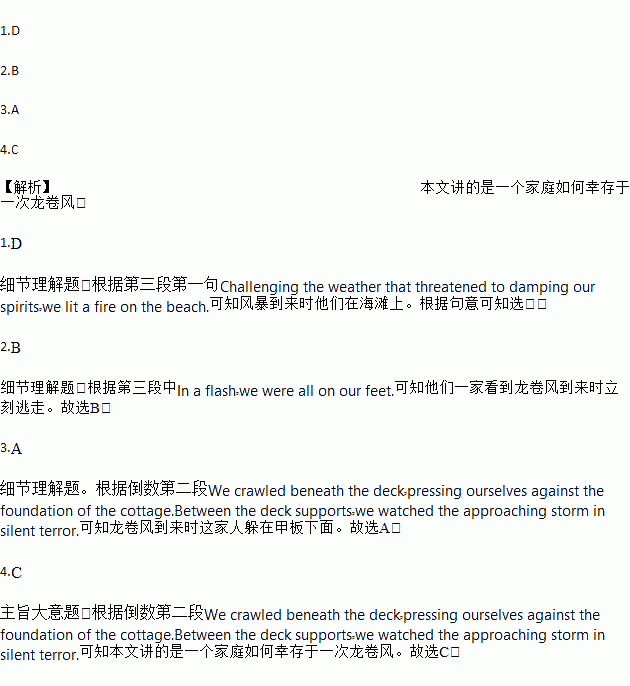题目内容
I began to worry that maybe we had made a mistake when the sand began kicking up and hitting our faces.
That afternoon,my dad had stood on the deck of our home and laughed as our neighbors packed up their cars and headed inland.They left to spend the night in motels or at friends’ homes that were out of range of approaching summer storm.
Challenging the weather that threatened to damping our spirits,we lit a fire on the beach.Dad told jokes and we had a good time.When it was 6:30 pm,all laughter disappeared.Ours eyes were drawn to the sky.A tornado was headed straight for us!In a flash,we were all on our feet.The wind started screaming and now we were running to the cottage.My mom stopped next to the front door."where can we go?"She shouted at my dad.
Most cottages on this part of Lake Michigan had been built without basements.Ours was no exception.The huge windows and the cottage itself wouldn't offer safety from high wind.
"Follow me!"my dad yelled.We crawled beneath the deck,pressing ourselves against the foundation of the cottage.Between the deck supports,we watched the approaching storm in silent terror.
My dad shouted,"Hold on!"and something else I couldn't hear over the screaming wind.I think he was praying. By the time it reached our cottage,it was nothing more than a strong wind.The rest of the storm lasted for an hour and then simply blew away.
1.what did the family do before the storm came ?
A. They left the motels. B. They visited their neighbors.
C. They packed up the cars. D. They stayed on the beach.
2.What was the family do before the storm came?
A. Praying in silent terror. B. Running away at once.
C. Crawling on the ground. D. Closing their eyes tightly
3.Where did the family stay in the storm ?
A. Under a deck. B. In a basement.
C. Inside the car D. Behind a door
4.What can be the best title for the text ?
A. Life on the beach B. An Unusual Cottage
C. Surviving a Storm D. My Admirable Family

